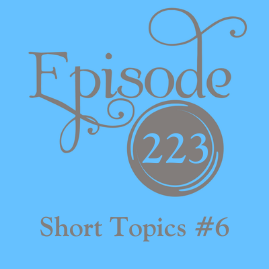
This Charlotte Mason podcast episode addresses three short topics: the lists of attainments for six and 12-year-olds, what age is right to start school, and memorization. Liz, Emily, and Nicole each tackle one of these and gives you the short and simple advice from Charlotte Mason.
Listen Now:

A Formidable List of Attainments for a Child of 6
School Education, Appendix III (What a Child Should Know at Twelve)
Home Education, Part V, Chapter VII, “Recitation”

“a full six years of passive receptive life.” (1/43)
“At six or seven, definite lessons should begin, and these need not be watered down or served with jam for the acute intelligences that will in this way be brought to bear on them.” (1/193)
“When children have begun regular lessons (that is, as soon as they are six)…” (1/308)
“We (of the PNEU) begin the definite ‘school’ education of children when they are six; they are no doubt capable of beginning a year or two earlier but the fact is that nature and circumstances have provided such a wide field of education for young children that it seems better to abstain from requiring direct intellectual efforts until they have arrived at that age.” (6/159)
“Children of seven are promoted to Form IA in which they remain for a couple of years…children are in Form IA from 7-9…” (6/174…191)
“The child of six goes into Class IA [which is the previous name for what we now call Form IB].” (3/372)
“…now offers a fairly complete introduction to methods of teaching subjects fit for children between the ages of six and nine.” (1/xxiv)
“period of a child’s life between his sixth and his ninth year should be used to lay the basis of a liberal education, and of the habit of reading for instruction.” (1/xxiii)
“…the normal child of six listens with delight” to his Bible lessons (6/160)
“Every scholar of six years old and upwards should study with ‘delight’ his own, living, books on every subject in a pretty wide curriculum…Children between six and eight must for the most part have their books read to them.” (3/214)
“And now let us take our child of five and a half or six when he should first enter the home schoolroom and begin his real lessons. What does he know and what can he do? He should, we believe, be an interesting, and interested little pupil. His will is trained to ready, cheerful obedience; he has the habits of attention, of quick bright observation, of accurate description, of neatness & promptitude. He is eager to learn, lessons have no terrors for him; he wants to know, and he is not afraid of work. He has an intimate and loving every-day acquaintance with the names and habits of the flowers, birds, and insects around him. His ear, hand, and eye have had definite training. In fact, the ground has been prepared for good teaching and he has been put in the right attitude towards the good teacher. Can he read and write? Not always. I do not advocate definite instruction other than what has been sketched out before the child is six.” (Henrietta Franklin, Home Training of Children)
“One of the most obvious facts about children is that, while their memories are usually strong, their powers of reasoning and abstraction are weak. Hence has arisen a theory of education, according to which, we should use the years while memory is strong to store the mind with materials for use when the power of acquisition grows relatively weaker, and the understanding, on the contrary, more vigorous. This was the basis of the old system,… This neglect of the understanding is a mistake from which modern education is much freer, though not altogether free. … deal only with memory, content yourself with exacting merely a verbal repetition of lines that are never thought about or understood-what happens? Not simply that observation, imagination, and understanding are not trained, are lying fallow. Oh no, you have been injuring them. You have been accustoming them to lie idle and uninterested, when you should have shown them how to be up and doing. You have been training your child to be stupid and unintelligent.” (R. Somervell, “Lessons Before School”, PR 7, 1896)
“Memory is the storehouse of whatever knowledge we possess; and it is upon the fact of the stores lodged in the memory that we take rank as intelligent beings.” (1/154)
“They cram to pass, and not to know, they do pass, and they don’t know.”(1/155)
“Recitation and committing to memory are not necessarily the same thing, … and it is well to store a child’s memory with a good deal of poetry, learnt without labour.” (1/224)
“The purpose of so-called object-lessons is to assist a child, by careful examination of a given object, to find out all he can about it through the use of his several senses. General information about the object is thrown in, and lodges only because the child’s senses have been exercised and his interest aroused.” (2/180)

